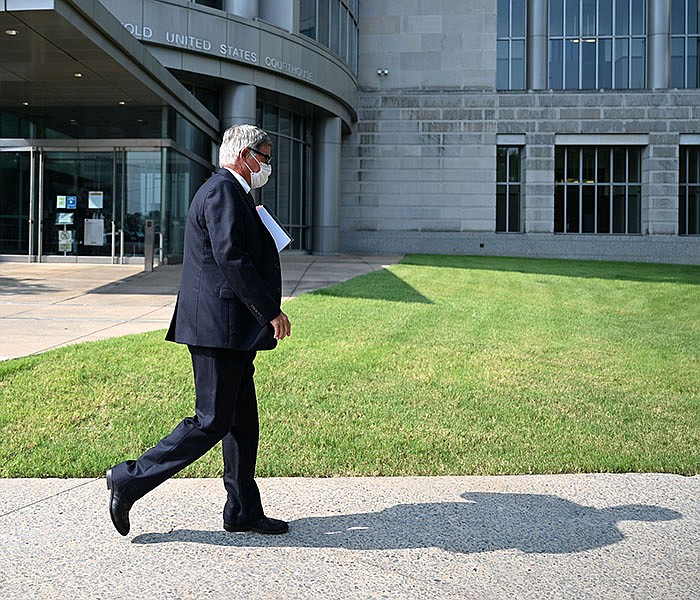In an effort Tuesday afternoon to avoid a possible hung jury in the bribery trial of former Republican state Sen. Gilbert Baker, Chief U.S. District Judge D. Price Marshall Jr. took the unusual step of instructing the jury to get a good night's sleep and return to court this morning. The move is known as an "Allen Charge."
The move, sometimes referred to as "dynamiting" the jury, was made after Marshall received conflicting notes -- one from the jury foreman and one from a juror -- regarding the state of deliberations near the end of the day Tuesday.
Baker, 64, of Conway is accused of bribing former Faulkner County Circuit Judge Mike Maggio to reduce a $5.2 million jury award against Greenbrier Nursing and Rehabilitation Center in 2013 in a lawsuit filed by the family of Martha Bull. Bull died two weeks after being admitted for a one-month rehabilitation stint at the center, which is owned by Michael Morton of Fort Smith. Maggio pleaded guilty to bribery in 2015 and was sentenced to 10 years in prison.
Baker is charged with one count each of conspiracy and bribery of a federal programs agent and seven counts of honest-services wire fraud.
"OK, so we have another note which is going to be court's Exhibit No. 18," Marshall said Tuesday afternoon as he discussed the matter with Assistant U.S. Attorney Julie Peters and defense attorneys Blake Hendrix and Annie Depper. "It says, Judge, exclamation point, we are deadlocked, underscore. And it's signed by a juror."
Marshall then turned to the second note, signed by the jury foreman, which read, "We are still deliberating and need more time to discuss this case. We are wanting to leave around 3:30-4 p.m. to regroup and come back tomorrow fresh."
Turning his attention to the attorneys, Marshall asked their preferences in handling the matter.
"Dynamite them right now and say go till 5," Hendrix said. "We'll check your temperature at 5 o'clock."
Peters, although willing to give the jury an ultimatum, suggested a softer approach.
"I hate to force the jury to keep going when we've told them they can set their own schedule and the foreperson expressing they need a break," she said. "I see both sides of it, but I think our recommendation is to give them the dynamite instruction and tell them to come back in the morning."
After a brief conference between Peters, Hendrix and Depper, the three attorneys agreed to the Allen Charge but to give the jury an additional day to resolve its impasse.
"I'm going to tell them again ... it's important for them to try hard and to think anew about the case," Marshall said, "leave it here, come back in the morning and try again. ... I'm also going to remind them that there are many verdicts and it is quite possible to reach unanimity on some but not all of the charges.
"If that's where we end up after trying again," he continued, "then that's what we need to hear from them. It's not an all-or-nothing proposition."
Another complication involved the same juror who notified Marshall the jury was deadlocked. That juror had earlier attempted to be excused after feeling ill earlier in the day but agreed to continue on after Marshall said excusing a juror after two days of deliberation would require seating an alternate and beginning deliberations anew.
After the jury was back, Marshall began, "I have the latest note that speaks in two different directions," which prompted a sharp laugh from one of the jurors.
"That's OK," he continued. "I've decided to give you a few more instructions and send you home and ask that you come back fresh in the morning."
Marshall then asked the juror who had earlier asked to be excused if there was anything that needed to be discussed with him and the attorneys.
"I'm all right," the juror answered.
"If this case were easy, it would have been resolved some other way," Marshall told the jury. "It's hard. The work the jury has to do is hard. ... I know you're trying hard, that you are deliberating, looking at evidence and talking to each other. I need you to keep doing that a little while longer."
Marshall commented on the effort and expense that had gone into the trial and noted that another go at it would not ensure the process would yield a better result.
"This has been a long road, and there's no reason to think we can do it better if we do it all again," he said.
Jury deliberations are set to begin at 8:30 a.m. Marshall told the jury that if it remains deadlocked on any counts, to advise him of that at some point during the day and he would consider again whether to halt the trial or have the jury continue with its deliberations.
"If there is disagreement that remains, that's OK because you will have tried hard," he said. "But do your best. Try again. And remember that your verdicts are separate."
Marshall said that there are three options for each charge Baker faces; guilty, not guilty, or deadlocked, and asked the jury to consider each charge carefully and examine all of the evidence.
"It's your call, it's not for me to say," he said. "If half a hog is all I can get instead of the whole hog, we'll take it."
